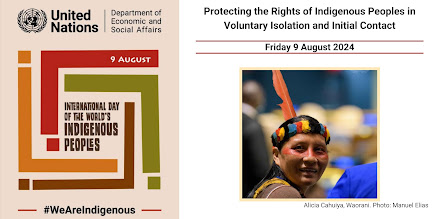FORUM: “Protecting the Rights of Indigenous Peoples in Voluntary Isolation and Initial Contact.” International Day of the World’s Indigenous Peoples 2024. For Indigenous Peoples living in voluntary isolation and initial contact, one of the most serious threats from external contact is the exposure to diseases. Due to their isolation, they do not have the immunological defenses to relatively common diseases. As such, forced contact with the outside world can lead to devastating consequences, and can destroy whole societies. Indigenous Peoples in voluntary isolation and initial contact are the best protectors of the forest. Where their collective rights to lands and territories are protected, the forests thrive, alongside their societies. And not only is their survival crucial to the protection of our planet, but it is crucial to the protection of cultural and linguistic diversity. In today’s hyper-connected world, the existence of Indigenous Peoples in voluntary isolation and initial contact is a testament to the rich and complex tapestry of humanity, and it is a huge loss to our world if they cease to exist. Despite their right to autonomy as enshrined in the UN Declaration on the Rights of Indigenous Peoples, Indigenous Peoples in voluntary isolation and initial contact face unique challenges often overlooked by the surrounding world. Developments for agriculture, mining, tourism and natural resources in their territories is resulting in the deforestation of swathes of Indigenous Peoples’ forests, disrupting their way of life and destroying the natural environment that they have protected for generations. Follow the conversations with the hashtags: #9August, #WeareIndigenous, #IndigenouspeoplesDay.
EVENTS: On Friday, August 9th from 9:30 a.m. to 10:00 a.m. EST/New York time; The International Day of the World’s Indigenous Peoples 2024 Commemorative event will be held. Speakers will share expertise on protecting the rights of Indigenous Peoples in voluntary isolation and initial contact. The virtual commemoration will include an opening segment with a traditional ceremony, followed by a pre-recorded statement from the UN Secretary-General and a statement from the Chair of the Permanent Forum on Indigenous Issues. A moderated panel with invited speakers will consider who Indigenous Peoples in voluntary isolation and initial contact are, and the pressing challenges that they face for their survival. This will be followed by a discussion with invited speakers to share advancements on how their rights can be effectively recognized and protected. In the lead-up to the Sustainable Development Goals Summit 2024 from September 22nd to September 23rd, marking the mid-point of the implementation of the 2030 Agenda, and the Summit of the Future 2024. It is important to ensure an inclusive and diverse youth engagement in multilateral fora towards transformative changes in decision-making processes. Read the Concept Note, the Tentative Programme and to register to participate to the virtual event.
Invited Speakers
Traditional Opening Ceremony:
- Mr. Manari Ushigua Santi, political and spiritual leader of the Sápara Nation
- Video Message by Mr. António Guterres, UN Secretary-General
- Message by Ms. Hindou Oumarou Ibrahim, UNPFII Chairperson
Panel Discussion
- Mr Eduardo Pichilingue Ramos, Director, Fundación Pachamama Perú
- Ms Rukka Sombolinggi (Toraja), Secretary-General, AMAN
- Ms Hueiya Alicia Cahuiya Iteca (Waorani), National leader of CONAIE’s Bureau
- Mr Jose Francisco Calí Tzay, Special Rapporteur on the Rights of Indigenous Peoples (Maya Kaqchikel)
- Mr Manuel Carmona Yebra, Deputy Head of Global Issues and Innovation & Counsellor for Environment and Oceans, Delegation of EU to US
- Ms Caroline Pearce, Executive Director, Survival International
Closing Remarks
- Freddy Mamani Machaca (Quechua Aymara), Coordinator of Indigenous Affairs, Amazon Cooperation Treaty Organization
From 21 August to 12 November 2024 will be held several Regional meetings ahead of the Global Meeting of the Indigenous Peoples’ Forum at IFAD. The theme of the 2025 Indigenous Peoples’ Forum at IFAD is “Indigenous Peoples’ right to self-determination: a pathway for food security and sovereignty”. Ahead of this, regional consultation meetings will engage representatives of Indigenous Peoples and facilitate dialogue with IFAD staff. Here, Indigenous Peoples can discuss their economic, social and cultural development. They will also inform decisions about policies and programmes that impact their lives, with a focus on food security and sovereignty. Read the concept note.
Indigenous Peoples represent around 6 per cent of the world's population.
Yet their stewardship signifies an outsized contribution to our global community.
They are the keepers of knowledge and traditions that help safeguard some of the most biodiverse areas of our planet.
As guardians of the environment, their survival is our survival.
Their unique way of life is a testament to the rich tapestry of humanity.
But they also face serious challenges that threaten their very existence.
Indigenous Peoples are often the victims of threats and violence.
Extractive and productive sectors, like mining, agriculture, and transport have accelerated deforestation and land degradation.
Ancestral homelands and natural resources that they depend on for survival are coming under siege.
And their rights to self-determination and agency – enshrined in the UN Declaration on the Rights of Indigenous Peoples – are yet to be fulfilled.
This year’s theme reminds us of their rights to protect themselves from unwanted contact.
Contact that can have a devastating impact.
Exposure to infectious diseases, forced assimilation, and the disruption of culture, language, and livelihoods.
Today and every day, the world must stand behind the rights of Indigenous Peoples to chart their own futures.
Together, let us safeguard their rights to live in peace and dignity.
António Guterres.
Other statements
- Statement by United Nations Special Rapporteur on the rights of Indigenous Peoples, Mr. José Francisco Calí Tzay on the International Day of the World’s Indigenous Peoples 2024.
- Statement by Ms. Astrid Schomaker, Executive Secretary, Convention on Biological Diversity on the International Day of the World’s Indigenous Peoples 2024.
- Statement by Mr. Daren Tang, Director General of WIPO on the International Day of the World’s Indigenous Peoples 2024. EN | ES | FR
- Statement by Ms Audrey Azoulay, Director-General of UNESCOon the International Day of the World’s Indigenous Peoples 2024.


No comments:
Post a Comment